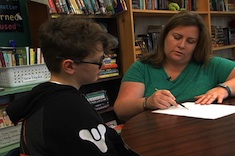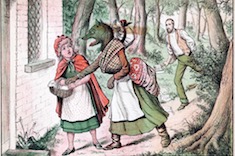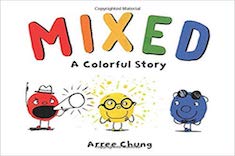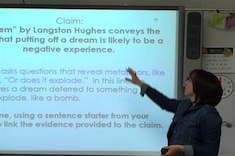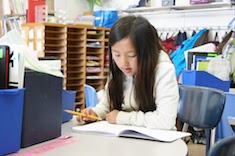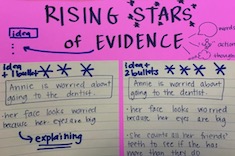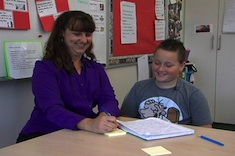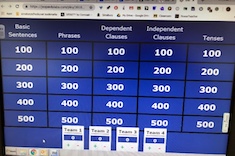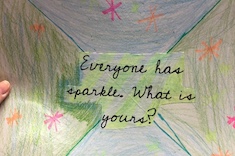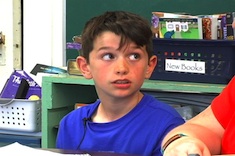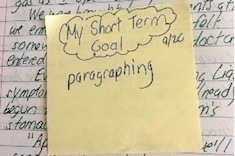Library
Choice Literacy Articles & Videos
The Choice Literacy library contains over 3,000 articles and 900 videos from 150+ contributors. Classic Classroom and Literacy Leadership subscribers have access to the entire library. Content is updated continuously, with five to six new features published each week.
Latest Content
Scaffolding Revision with a Mentor Text
Tara Barnett and Kate Mills show how to break down mentor texts into brief excerpts for step-by-step scaffolding of writers in the intermediate grades.
Crafting the Basics: First-Grade Writing Conference
Bitsy Parks confers with Aubrey early in the year, using books from whole-class lessons as a scaffold for understanding key text elements like title, author, and illustrations.
Exploring Dystopian Literature: Fifth-Grade Reading Conference
Katherine Sokolowski confers with Ian about The Giver, broadening his understanding of the text to consider other dystopian literature.
Bringing Multiple Texts and Perspectives into Teaching Point of View
Katherine Sokolowski finds her students are struggling to understand point of view. She takes a detour over a week with mentor texts, quick assists from favorite writers on Twitter, and practice sessions retelling Little Red Riding Hood to teach the concept.
Detour Texts
Clare Landrigan and Tammy Mulligan explain the concept of “detour texts”—picture books to use as mentor texts in the intermediate grades to illustrate complex literary elements. They also share three of their favorite new children’s books to use as detours.
February 15, 2019 Abandoned Canoes
This week we focus on revision minilessons in the intermediate grades.
Revising Literary Analysis Essays: Supporting Claims
Christy Rush-Levine presents a minilesson to her eighth-grade students about revising their literary analysis essays, using an analogy about putting furniture together.
Revising Dialogue in Narrative Writing
Melanie Meehan finds that a “lift the flap” strategy works for showing students different revision options with dialogue.
Practical Revision Strategies
If your students are equating revision with proofreading and final cleanups, Tara Barnett and Kate Mills have some practical revision strategies you might want to try.
February 8, 2019 The Community Potato
We share some creative takes on reading response in this week’s Big Fresh.
Thoughtful Read Aloud Structures
Franki Sibberson shares how she integrates student choice and collaboration into reading response during daily read alouds.
Linking Evidence to Reading Response in First Grade
Tara Barnett and Kate Mills are discouraged by the random and idiosyncratic responses to reading they are seeing among first graders. They implement a series of lessons to help students move to evidence-based reading responses.
Readers Want to Respond
Matt Renwick is surprised when his son completes a reading quiz that isn’t required, and finally realizes it’s all about reading response.
February 1, 2019 Pick a Lane
We explore literacy cures for the winter doldrums in this week’s Big Fresh.
5 Strategies for Engaging Boy Writers
Jennifer Allen has been fascinated with helping boys write for years, ever since her own son insisted on writing on the same topic over and over again. She shares her five favorite strategies for boosting interest in writing among boys.
Analyzing Voice: Conferring with Griffin
Gigi McAllister helps fourth grader Griffin re-engage with his writing by pointing out some of the unique qualities of voice and style his piece possesses.
Things That Can Fly Away—A Tribute to Mary Oliver
Shirl McPhillips honors the poet Mary Oliver upon her passing, reflecting on the power of favorite poems and poets to endure in the lives of writers.
January 25, 2019 Peach Pit
We look at teaching grammar in creative ways in this week’s Big Fresh.
Mindful Test-Taking
High-stakes tests weigh on teachers and students through the winter and spring. Mark Levine shares mindfulness strategies for test-taking, explaining how to help students recommit and refocus in the midst of an exam.
Clapping Syllables Routine in First Grade
Bitsy Parks works with her first graders early in the year to teach them the basics of how words are constructed, by clapping through syllable counts.
Grammar Games
Melanie Meehan shares two of her favorite games for teaching grammar, including templates and web resources.
January 18, 2019 Wins and Losses
We look at collaboration and teamwork in this week’s Big Fresh.
Picture Books to Teach Digital Citizenship
Students aren’t just collaborative in our classrooms—they are connecting with others all over the world. Stephanie Affinito shares her favorite picture books to teach digital citizenship.
An All-School Writing Project: Six-Word Memoirs
If you want to bring everyone in your school together around writing, you can’t beat the simplicity and fun of six-word memoirs. Jennifer Schwanke describes how she sparked enthusiasm for the project in her school.
January 11, 2019 Stand Next to Me
We look at how to change struggles to strengths in this week’s Big Fresh.
The Importance of Correct Examples
Melanie Meehan explains why it is important to mentor students who are struggling with correct examples, and why she cautions writing teachers to avoid “find the mistakes” exercises.
Practical Advice for Dealing with Messy Handwriting
Do struggles with handwriting matter? They do when a student can’t even decipher his own words. Katherine Sokolowski confers with fifth grader Sauvi to help him find solutions to the problem.
The Magic That Might Go Down
Christy Rush-Levine decides to slow down in her classroom and engage more fully with a student who is a wiseacre and resistant reader. What happens next can only be described as magic.
January 4, 2019 Reset
We consider ways teachers can reset routines and expectations early in the new year in this week’s Big Fresh.
Building Habits with Short-Term Goals
Tara Barnett and Kate Mills explain why short-term writing goals can help students reset expectations for their writing on a daily basis, and how they make these goals an integral part of their writing workshops.
Browse Content By
Type
Category
- Assessment Tools
- Big Fresh Archives
- Booklists
- Choice Numeracy
- Classroom Design
- Common Core
- Community Building
- Conferring
- Content Literacy
- Digital Literacy
- English Language Learners
- Equity
- Family Relations
- Free Samples
- Guiding Groups
- Leadership
- Literacy Coaches
- Mentor Texts
- Minilessons
- New Teacher Mentors
- Podcasts
- Poetry
- Quote Collections
- Reading Strategies
- Self Care
- Struggling and Striving Learners
- Talking and Listening
- Teacher Study Groups
- Teaching Reading
- Teaching Writing
- Word Study and Vocabulary
Author
- Melissa Quimby
- Nawal Qarooni
- Gwen Blumberg
- Julie Cox
- The Lead Learners
- Hannah Tills
- Josie Stewart
- Ruth Metcalfe
- Mallory Messenger
- Becca Burk
- Jodie Bailey
- Vivian Chen
- Mary Brower
- Tiffany Abbott Fuller
- Stephanie Affinito
- Ruth Ayres
- Leigh Anne Eck
- Heather Fisher
- Shari Frost
- Julie Johnson
- Suzy Kaback
- Gigi McAllister
- Shirl McPhillips
- Melanie Meehan
- Cathy Mere
- Debbie Miller
- Tara Barnett and Kate Mills
- Tammy Mulligan
- Dana Murphy
- Bitsy Parks
- David Pittman
- Brenda Power
- Heather Rader
- Matt Renwick
- Mandy Robek
- Christy Rush-Levine
- Gretchen Schroeder
- Jen Schwanke
- Brian Sepe
- Katherine Sokolowski
- Stella Villalba
- Jennifer Vincent
Grade Level
Choice Literacy Membership
Articles
Get full access to all Choice Literacy article content
Videos
Get full access to all Choice Literacy video content
Courses
Access Choice Literacy course curriculum and training



